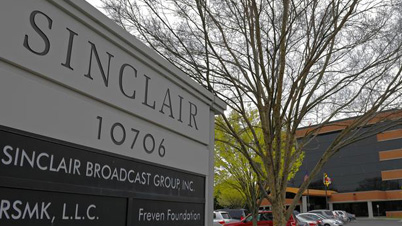“Anyone that doubted the power of local TV’s brand awareness capabilities needs to look no further than this year’s political spending.” This was the message Sinclair President-CEO Christopher S. Ripley had for securities analysts tuned into the company’s third quarter results conference call Wednesday morning.
Sinclair not only exceeded guidance, it exceeded every other midterm election in the company’s history, and also exceeded political income earned during the 2016 presidential election. Only the 2012 presidential cycle exceeded this year’s 3Q political results. As Television Group EVP-COO Steven M. Marks put it: “We’re drunk on political.”
“We exceeded our third quarter guidance in all key financial metrics,” said SVP-CFO Lucy A. Rutishauser, noting in particular that the $730.4 million in media earnings for the quarter was $14 million ahead of guidance. Pro forma, the gain was still a robust 13% for the category.
Expanding on political results, Marks said Sinclair was expecting $45 million-$50 million in 3Q political. It made $70 million. Another $145 million-$148 million has been brought in during 4Q, he said, and as a result, Sinclair’s prior guidance of $160 million in political for the full year is being raised all the way to $250 million-$253 million. “We believe this is a strong indication of just how robust the 2020 presidential year political ad spend could be.”
Marks said political is expected to drive a 21%-22% revenue gain for 4Q.
Core was down low-single-digits in the third quarter and is expected to be down mid-single-digits in 4Q, due to the large amount of displacement. Marks was actually pleased with the 3Q result, saying: “With the crowd-outs, our core in third quarter was the best quarter that we’ve had to date. That’s pretty encouraging.”
Auto is no exception to the crowd-out phenomenon, said Marks, but he noted that Sinclair divides the category into eight subsets and said that four of them were up, which he found encouraging. He had no prediction for 2019 performance for the category.
Rutishauser said that net retrans was up low-single-digits in 3Q, a result that will be repeated in 4Q and for the year as a whole based on contract timing. She said growth in the low teens is expected for both 2019 and 2020.
On the regulatory front, Ripley said the major hanging issue is the national broadcast television ownership cap, and he’s not expecting the FCC to do anything until broadcasters themselves have some “unanimity” on just what it should be. He believes the FCC does want to deregulate if the industry can “get on the same page.”
M&A talks are in progress, said Ripley, without mentioning any specifics.
Rutishauser said the company is currently sitting on a record low leverage point of 3.3x and expects to lower it to 3.15x by the end of the year.
Ripley lauded the commitment of Fox and NBC to ATSC 3.0, and said Sinclair will keep ball moving during 2019. Test are under way in Phoenix, Dallas and Chicago, and there will be rollouts in 20-30 additional markets. Also, the first mobile chipset will be unveiled at CES 2019 in January. He added that as a whole, the entire industry is behind the effort.
Sinclair will be entering into a consent decree with the Department of Justice over charges of the sharing of ad sales pacing information that have been leveled at several television groups. The decree carries no need to admit guilt or make any type of monetary payment.
Ripley explained: “We agreed to do this consent decree despite our belief that there was no actual impact on the pricing of advertising or any violation of any antitrust laws, because the costs of compliance with the consent decree are minimal, and this allows us to avoid potential significant costs of continuing to dispute this with the DOJ and a potential lawsuit.”

































Comments (0)